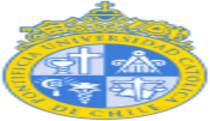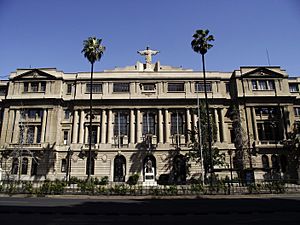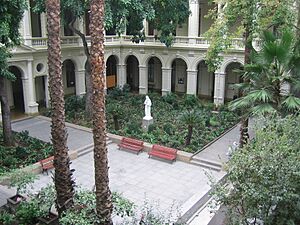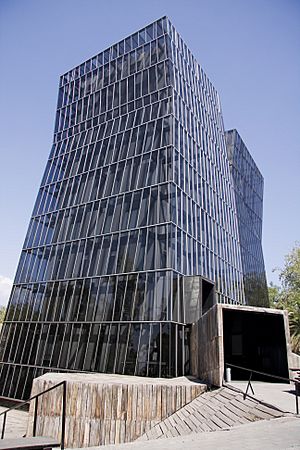Pontifical Catholic University of Chile facts for kids
|
Pontificia Universidad Católica de Chile
|
|
 |
|
| Motto | In Christi lumine pro mundi vita |
|---|---|
| Type | Private (Traditional) |
| Established | 21 June 1888 |
|
Religious affiliation
|
Catholic Church |
|
Academic affiliations
|
Clover 2030 Engineering |
| Chancellor | Fernando Chomalí Garib, Archbishop of Santiago |
| Rector | Juan Carlos de la Llera |
|
Academic staff
|
1,652 (full-time) |
|
Administrative staff
|
2,210 (full-time) |
| Students | 33,769 |
| Undergraduates | 29,212 |
| Postgraduates | 4,557 |
| Address |
Avenida Libertador General Bernardo O'Higgins #340
,
,
,
Chile
|
| Mascot | Pangui |
The Pontifical Catholic University of Chile (often called UC Chile) is a well-known private university located in Santiago, Chile. It is one of the oldest universities in Chile, founded way back in 1888. It's also one of the top universities in Latin America. For example, in 2025, it was ranked 2nd in the region and 93rd in the world by QS Ranking.
UC Chile has a friendly rivalry with the University of Chile. Both are very respected universities in the country. One is a Catholic university, and the other is not connected to a religion. This rivalry even extends to sports, especially football!
Contents
University Campuses
UC Chile has several campuses where students learn and study. There are four campuses in Santiago, the capital city, and one campus in Villarrica, a town further south.
The campuses in Santiago are:
- Casa Central (this is the main building in downtown Santiago)
- San Joaquín (located in the Macul area of Santiago)
- Oriente (in the Ñuñoa area of Santiago)
- Lo Contador (in the Providencia area of Santiago)
These campuses have many buildings and spaces for students. The Villarrica campus is smaller but also offers great learning opportunities.
A Look at History
UC Chile was started on June 21, 1888. It was founded by the Archbishop of Santiago. The idea was to teach students important skills for jobs like law, business, chemistry, and even electricity. The first leader of the university was Monsignor Joaquín Larraín Gandarillas. When it first opened, it only taught two subjects: law and mathematics.
Because it is a "Pontifical" university, it has always had a close connection with the Vatican in Rome. In 1930, Pope Pius XI officially named it a pontifical university. A year later, in 1931, the Chilean government gave it full freedom to run its own academic programs.
UC Chile is a private university with many campuses in the city. It is one of eleven Catholic universities in Chile. Even though it's private, the Chilean government helps support it with money for different programs.
The university has 18 different departments, called faculties. These are spread across the four Santiago campuses and the one in Villarrica. UC Chile also has special centers that help with technical training and community work, like the Duoc UC and the Rural Life Foundations. They also have a Sports Club and a hospital connected to the Faculty of Medicine.
Many famous buildings in Chile were designed by graduates from UC Chile's School of Architecture. These include the university's own main building and the National Library.
Some very important people have studied at UC Chile. These include Saint Alberto Hurtado, a Jesuit priest who is now a saint in Chile, and Eduardo Frei Montalva, who was a Chilean president. Both of them studied law. Another former Chilean president, Sebastián Piñera, studied economics at the university.
Teamwork and Collaborations
UC Chile works with other universities around the world to share knowledge and ideas.
- The Department of Industry and System Engineering works with the Stanford Technology Venture Program at Stanford University. They collaborate on new ideas and technology projects.
- In 2011, the engineering schools of UC Chile and the University of Notre Dame in the United States agreed to offer a special joint degree in civil engineering and geological sciences. This partnership has grown to include other departments too.
- In 2013, UC Chile and the University of Notre Dame also signed an agreement to make their academic connections even stronger. This allows professors, students, and university representatives from both places to visit, work, study, and collaborate with each other.
University Rankings
| University rankings | |
|---|---|
| Global – Overall | |
| ARWU World | 501-600 (2022) |
| CWUR World | 390 (2023) |
| CWTS World | 555 (2023) |
| QS World | 93 (2025) |
| THE World | 401–500 (2023) |
| USNWR Global | =314 (2022-23) |
| Regional – Overall | |
| QS Latin America | 1 (2023) |
| THE Latin America | 1 (2020) |
| USNWR Latin America | 3 (2022-23) |
UC Chile is often ranked among the top universities in Latin America. For example, the QS World University Rankings has named it the best university in Latin America for several years in a row (from 2018 to 2023). The Times Higher Education University Rankings also gave it the top spot in Latin America in 2019 and 2020.
The university also does very well in specific subjects. According to the Shanghai ranking, it's ranked highly in Economics and Management (around 101–150) and in Mathematics (around 151–200).
What You Can Study at UC Chile
UC Chile offers a wide range of subjects and programs for students. Here are some of the main areas of study:
- College UC
- Natural Sciences and Mathematics
- Social Science
- Arts and Humanities
- Faculty of Agronomy & Forest Engineering
- Agronomy (study of crops and soil)
- Forest Engineering (managing forests)
- Faculty of Architecture, Design, and Urban Studies
- School of Architecture (designing buildings)
- School of Design (creating products and visuals)
- Institute of Urban and Territorial Studies (planning cities)
- Faculty of Arts
- School of Visual Art (painting, sculpture, etc.)
- School of Theater (acting and stage production)
- Institute of Music (playing and studying music)
- Faculty of Biological Sciences
- Biology (study of living things)
- Biochemistry (chemistry of life)
- Marine Biology (life in the ocean)
- Faculty of Economic and Administrative Sciences
- Commercial Engineering (business and engineering)
- Economics Institute (how money and resources work)
- School of Administration (managing businesses)
- Faculty of Social Sciences
- Institute of Sociology (study of society)
- School of Anthropology (study of human cultures)
- School of Psychology (study of the mind)
- School of Social Work (helping people and communities)
- Faculty of Communications
- School of Journalism (reporting news)
- Audiovisual Direction Program (making films and videos)
- Advertising (creating ads)
- Faculty of Law
- Law (legal studies)
- Faculty of Language and Literature
- English Language and Literature
- Hispanic American Linguistics and Literature (Spanish language and literature)
- Center for the Study of Chilean Literature (CELICH)
- Faculty of Education
- Early Childhood Education (teaching young children)
- General Education (teaching in schools)
- High School Education (teaching teenagers)
- Faculty of Engineering
- School of Engineering
- Computer Science
- Engineering and Construction Management
- Structural and Geotechnical Engineering
- Hydraulic and Environmental Engineering
- Transportation and Logistics Engineering
- Industrial and Systems Engineering
- Mechanical and Metallurgical Engineering
- Chemical and Bioprocess Engineering
- Electrical Engineering
- Mining Engineering
- School of Construction (building and construction)
- School of Engineering
- Faculty of Philosophy
- Institute of Philosophy (thinking about big questions)
- Institute of Aesthetics (study of beauty and art)
- Faculty of Physics
- Department of Astronomy and Astrophysics (stars and space)
- Department of Physics (how the universe works)
- Faculty of History, Geography, and Political Science
- Institute of History (studying the past)
- Institute of Geography (studying the Earth's features)
- Institute of Political Science (how governments work)
- Faculty of Mathematics
- Mathematics
- Statistics (analyzing data)
- Faculty of Medicine
- School of Medicine
- Medicine (becoming a doctor)
- Odontology (dentistry)
- Phonoaudiology (speech therapy)
- Kinesiology (physical therapy)
- Nutrition and Dietetics (food and health)
- School of Nursing (nursing)
- School of Medicine
- Faculty of Chemistry
- Chemistry
- Chemistry and Pharmacy (making medicines)
- Faculty of Theology
- Theology (study of religion)
- Institute for Biological and Medical Engineering
- Biomedical Engineering (engineering for health)
- Institute for Mathematical and Computational Engineering
- Data Science Engineering (working with large data sets)
- School of Veterinary Medicine
- Veterinary Medicine (animal health)
Special Institutes and Centers
UC Chile also has special centers for research and projects:
- Center of Studies of Social Undertakings
- Instituto Milenio para la Investigación en Depresión y Personalidad – MIDAP
- Núcleo Milenio Research Center in Entrepreneurial Strategy Under Uncertainty
Famous People Who Studied Here
Many notable people have graduated from UC Chile, making important contributions in various fields.
Architecture
- Alejandro Aravena (a famous architect who won the Pritzker Architecture Prize in 2016)
- Smiljan Radic
- Emilio Duhart
- Fernando Castillo Velasco
- Juan Grimm, Landscape architect
Art and Literature
- Egon Wolff (a playwright)
- Roberto Matta (a well-known Surrealist painter)
- Jorge Díaz (a playwright)
- Diamela Eltit (an author)
- Paula Escobar (a journalist and academic)
- Laila Havilio (a sculptor)
- Paloma Valdivia (an author and illustrator)
Economics
- Miguel Kast (a former governor of the Central Bank of Chile)
- José Piñera
- Joaquín Lavín
- Sebastián Edwards (a professor at UCLA Anderson School of Management)
- Sebastián Piñera (a former Chilean president)
- Felipe Larraín
- Ricardo Caballero (a professor at MIT)
Politics
- Eduardo Frei Montalva (a former President of Chile)
- Sebastián Piñera (a former President of Chile)
- Adolfo Zaldívar
- Arturo Frei Bolívar
- Ena von Baer (a former Minister)
- Fernando Castillo Velasco
- Hernán Larraín
- Fernando Flores
- Jaime Guzmán
- Joaquín Lavín
- Osvaldo Andrade
- Radomiro Tomic
- Tomás Jocelyn-Holt
- José Antonio Kast
- Giorgio Jackson
Religion
- Alberto Hurtado (a Jesuit priest and Chile's second saint)
- Raúl Silva Henríquez (a former Archbishop of Santiago de Chile)
Both of these important religious figures studied law at the university.
Science
- Francisco Claro Huneeus
- Héctor Croxatto Rezzio (a member of the Pontifical Academy of Sciences)
- Joaquín Luco Valenzuela (the first Chilean to specialize in neuroscience)
- Juan de Dios Vial Correa (a former president of the Pontifical Academy for Life)
- Juan Carlos Castilla (an expert in marine life)
- Leopoldo Soto Norambuena (a former President of the Chilean Physics Society)
- Nibaldo Inestrosa Cantin (a neurobiologist)
- Neva Milicic Müller (a psychologist)
- Rafael Vicuña Errázuriz
Helping the Community
UC Chile also works to share its knowledge and provide services to the community.
- DICTUC SA: This group offers expert advice in engineering, management, and new ideas.
- Salud Clinica UC: This is a health network connected to the university.
- Hospital of the Pontificia Universidad Catolica de Chile: A hospital linked to the university.
- Mega UC Health Centres: These centers provide health services, including maternity care.
See also
 In Spanish: Pontificia Universidad Católica de Chile para niños
In Spanish: Pontificia Universidad Católica de Chile para niños
 | Kyle Baker |
 | Joseph Yoakum |
 | Laura Wheeler Waring |
 | Henry Ossawa Tanner |




